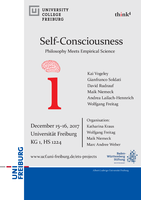Research
The chair in Epistemology and Theory of Science represents large parts of theoretical philosophy and some parts of practical philosophy. Major areas of research include epistemology, philosophy of science, philosophy of language and mind, logic and metaphysics, and the recent history of philosophy. In teaching we additionally cover introductions to the philosophy of action and rationality.
The chair is currently involved in the following research projects:
"Mind the Meaning – The Philosophy of Psychological Expressivism"
In this research project, we investigate self-ascriptions of mental states, so-called avowals. Avowals are affirmative first-person utterances such as "I wish that the sun were shining," "I believe that it is raining," and "I am in pain," i.e., utterances by which we represent our own mental states and in which the verb in the main clause is in the (nonprogressive) present tense, indicative, active. We explore Psychological Expressivism, i.e., the thesis that avowals are, typically, psychological expressives: rather than being, as they superficially seem, assertions about the speaker and his or her mental states, they express these states. Hence psychological expressivism promotes a non-standard view of how we refer to the contents of our minds.
While the basic idea of psychological expressivism has a venerable history, e.g., in Wittgenstein's later writings, there is no systematic exposition of its theory. One major purpose of the project is to fill this gap and embed psychological expressivism in a general theory of expressive acts. In addition, the idea that mental states are expressed rather than described by avowals also promises novel insights to important philosophical debates involving first-person reference. We therefore apply the theory of psychological expressivism to the problem of self-knowledge and to a number of puzzle cases such as Evans's Transparency and Wittgenstein's two uses of "I"; and provide historical applications by developing expressivist analyses of Kant's "I think" and of Descartes' Cogito.
Project leader: Prof. Dr. Wolfgang Freitag
Contact person: Dr. Marc Andree Weber
Funding: The project "Mind the Meaning" is funded by the Fritz Thyssen Stiftung für Wissenschaftsförderung.
think: Language and Self-Consciousness
Self-consciousness is widely discussed inside and outside of philosophy. It often finds linguistic expression in self-ascriptions of mental states such as "I think" and "I'm in pain". The philosophical discussion of self-consciousness is therefore intimately related to the understanding of utterances of this form. To a large extent, the debate is based on the cognitivist assumption that such self-ascriptions are autobiographical assertions whose content is identical with the semantic content of the sentences uttered. Expressivists in the tradition of Ryle and Wittgenstein, on the other hand, have claimed that such utterances are not expressions of second-order attitudes, of beliefs about one's thoughts or pains, but rather expressions of the thoughts or pains themselves. The aim of our research project is to provide a speech-act theoretical account of psychological expressivism and to explore the possibilities of expressivism also in relation to questions of first-person authority, self-knowledge, and self-consciousness.
 Latest event
Latest event
Workshop think4: "Self-Consciousness – Philosophy Meets Empirical Science” on December 15 and 16, 2017".
Subjects that exhibit self-consciousness are able to consciously recognize mental and bodily states as their own. Philosophical, neuroscientific and psychological theories of self-consciousness seek to account for this ability at different levels of explanation. Relevant questions are, for instance: How does self-consciousness emerge in a brain? Is self-consciousness in any interesting way distinct from the awareness of other things? Is it a non-conceptual, pre-reflective feature of all experiences? Further questions concern our way of referring to self-conscious states and the specific kind of knowledge that we seem to have of ourselves.The aim of this workshop is to explore contemporary neuroscientific and psychological answers to these questions and to discuss concepts and theories that philosophy can offer.
Participation is free and open to all who are interested. Registration please by email to office-ets@ucf.uni-freiburg.de.
Past events
- think1: Sprache und Selbstbewusstsein (2014) (Programme, Poster)
- think2: Repräsentationen des Ich (2015) (Programme, Poster)
- workshop with Dorit Bar-On: Neo-Expressivism (2016) (Poster)
- think3: Philosophy and the Semantics of "I" (2016) (Programme, Poster)
The First Person – Semantic, Epistemic, and Scientific Perspectives
The project investigates the purportedly special epistemic status of I-thoughts. These are thoughts by which we represent self-related mental states, such as our own beliefs, desires, and feelings (e.g., "I believe that it is snowing" and "I am in pain"). The project
- examines the semantic structure and the epistemic character of I-thoughts,
- analyses selected psychological and neuroscientific studies that either support or cast into doubt this epistemic status, and
- reflects more generally on the scientific status and the methodological relevance of self-reports in psychological and neuroscientific research.
Principal investigator: Katharina Kraus
Doctoral student: Maik Niemeck
The research project is funded by the Eliteprogramme for Postdocs of the Baden-Württemberg Stiftung.


